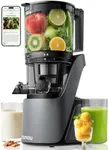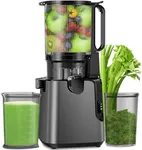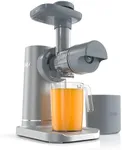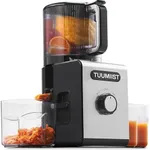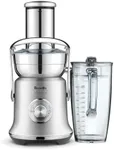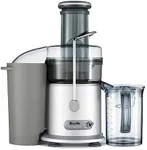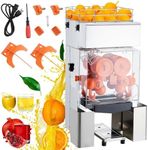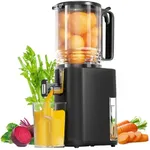Buying Guide for the Best Juicer Machines
Choosing the right juicer machine can make a significant difference in your daily routine and overall health. A good juicer can help you easily incorporate more fruits and vegetables into your diet, providing you with fresh, nutrient-rich juice. When selecting a juicer, it's important to consider several key specifications to ensure you get the best fit for your needs. Understanding these specs will help you make an informed decision and find a juicer that suits your lifestyle and preferences.Type of JuicerThere are mainly three types of juicers: centrifugal, masticating (slow juicers), and triturating (twin gear). Centrifugal juicers are fast and great for those who need quick results, but they may not extract as much juice and can be noisy. Masticating juicers operate at a slower speed, preserving more nutrients and yielding more juice, making them ideal for health enthusiasts. Triturating juicers are the most efficient and can handle a variety of produce, but they are also the most expensive and complex. Choose based on your priority: speed, nutrient retention, or versatility.
Juice YieldJuice yield refers to the amount of juice extracted from fruits and vegetables. Higher yield means more juice and less waste. Centrifugal juicers typically have a lower yield compared to masticating and triturating juicers. If you want to maximize the amount of juice you get from your produce, opt for a masticating or triturating juicer. Consider how much juice you plan to make and how often, as this will guide you in choosing a juicer with the appropriate yield.
Ease of CleaningCleaning a juicer can be a time-consuming task, so it's important to consider how easy it is to clean. Some juicers have more parts and intricate designs, making them harder to clean. Centrifugal juicers are generally easier to clean than masticating and triturating juicers. Look for juicers with dishwasher-safe parts or those that come with cleaning brushes. If you plan to use your juicer frequently, ease of cleaning should be a top priority to ensure you don't get discouraged from using it.
Size and StorageJuicers come in various sizes, and it's important to consider the space you have available in your kitchen. Larger juicers may offer more features and higher capacity but can take up more counter space. Smaller, more compact juicers are easier to store but may have fewer features. Think about where you will keep your juicer and how much space you can dedicate to it. If you have limited space, a compact model might be more suitable.
Noise LevelThe noise level of a juicer can be an important factor, especially if you plan to use it early in the morning or late at night. Centrifugal juicers tend to be noisier due to their high-speed operation, while masticating and triturating juicers are generally quieter. If noise is a concern for you, consider opting for a masticating or triturating juicer. Think about your household environment and when you will be using the juicer to determine the acceptable noise level.
Durability and WarrantyDurability refers to how long the juicer will last and how well it can withstand regular use. A good warranty can provide peace of mind and protect your investment. Masticating and triturating juicers are typically more durable due to their robust construction. Check the materials used in the juicer and read reviews to gauge its durability. A longer warranty period is often an indicator of the manufacturer's confidence in their product. Consider how often you will use the juicer and choose one that offers a good balance of durability and warranty.
